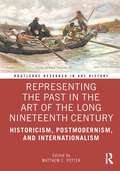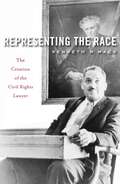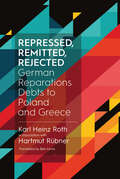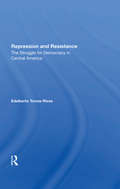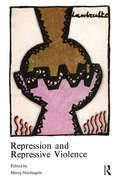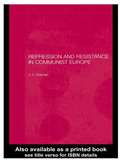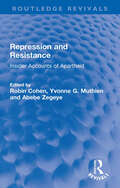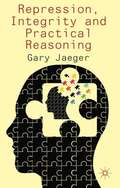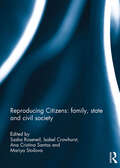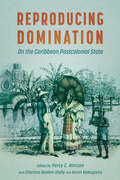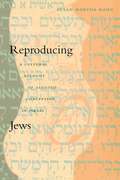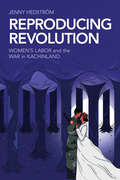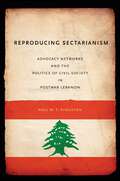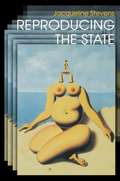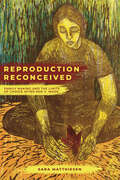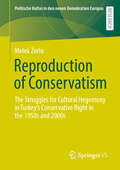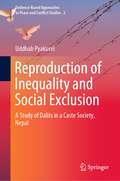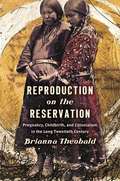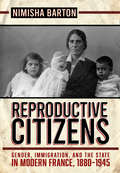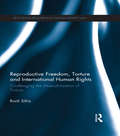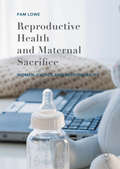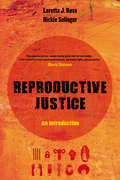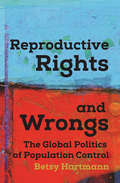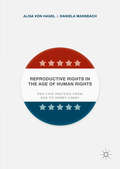- Table View
- List View
Representing the Past in the Art of the Long Nineteenth Century: Historicism, Postmodernism, and Internationalism (Routledge Research in Art History)
by Matthew C. PotterThis edited collection explores the intersection of historical studies and the artistic representation of the past in the long nineteenth century. The case studies provide not just an account of the pursuit of history in art within Western Europe but also examples from beyond that sphere. These cover canonical and conventional examples of history painting as well as more inclusive, ‘popular’ and vernacular visual cultural phenomena. General themes explored include the problematics internal to the theory and practice of academic history painting and historical genre painting, including compositional devices and the authenticity of artefacts depicted; relationships of power and purpose in historical art; the use of historical art for alternative Liberal and authoritarian ideals; the international cross-fertilisation of ideas about historical art; and exploration of the diverse influences of socioeconomic and geopolitical factors. This book will be of particular interest to scholars of the histories of nineteenth-century art and culture.
Representing the Past in the Art of the Long Nineteenth Century: Historicism, Postmodernism, and Internationalism (Routledge Research in Art History)
by Matthew C. PotterThis edited collection explores the intersection of historical studies and the artistic representation of the past in the long nineteenth century. The case studies provide not just an account of the pursuit of history in art within Western Europe but also examples from beyond that sphere. These cover canonical and conventional examples of history painting as well as more inclusive, ‘popular’ and vernacular visual cultural phenomena. General themes explored include the problematics internal to the theory and practice of academic history painting and historical genre painting, including compositional devices and the authenticity of artefacts depicted; relationships of power and purpose in historical art; the use of historical art for alternative Liberal and authoritarian ideals; the international cross-fertilisation of ideas about historical art; and exploration of the diverse influences of socioeconomic and geopolitical factors. This book will be of particular interest to scholars of the histories of nineteenth-century art and culture.
Representing the Race
by Kenneth W. MackRepresenting the Race tells the story of an enduring paradox of American race relations, through the prism of a collective biography of African American lawyers who worked in the era of segregation. Practicing the law and seeking justice for diverse clients, they confronted a tension between their racial identity as black men and women and their professional identity as lawyers. Both blacks and whites demanded that these attorneys stand apart from their racial community as members of the legal fraternity. Yet, at the same time, they were expected to be "authentic"-that is, in sympathy with the black masses. This conundrum, as Kenneth W. Mack shows, continues to reverberate through American politics today. Mack reorients what we thought we knew about famous figures such as Thurgood Marshall, who rose to prominence by convincing local blacks and prominent whites that he was-as nearly as possible-one of them. But he also introduces a little-known cast of characters to the American racial narrative. These include Loren Miller, the biracial Los Angeles lawyer who, after learning in college that he was black, became a Marxist critic of his fellow black attorneys and ultimately a leading civil rights advocate; and Pauli Murray, a black woman who seemed neither black nor white, neither man nor woman, who helped invent sex discrimination as a category of law. The stories of these lawyers pose the unsettling question: what, ultimately, does it mean to "represent" a minority group in the give-and-take of American law and politics?
Repressed, Remitted, Rejected: German Reparations Debts to Poland and Greece
by Dr Karl Heinz Roth Hartmut RübnerSince unification, the Federal Republic of Germany has made vaunted efforts to make amends for the crimes of the Third Reich. Yet it remains the case that the demands for restitution by many countries that were occupied during the Second World War are unresolved, and recent demands from Greece and Poland have only reignited old debates. This book reconstructs the German occupation of Poland and Greece and gives a thorough accounting of these debates. Working from the perspective of international law, it deepens the scholarly discourse around the issue, clarifying the ‘never-ending story’ of German reparations policy and making a principled call for further action. A compilation of primary sources comprising 125 annotated key texts (512 pages) on the complexity of reparations discussions covering the period between 1941 and the end of 2017 is available for free on the Berghahn Books website, doi: 10.3167/9781800732575.dd.
Repression And Resistance: The Struggle For Democracy In Central America
by Edelberto Torres-rivasThis book summarizes the multiple origins of the crisis that Central Americans are suffering today. It focuses on an analysis of the revolutionary popular movements as a form of social movement capable of joining together a diversity of class-based groups.
Repression and Repressive Violence
by Marjo HoefnagelsThese papers are the proceedings of the 3rd international working conference on violence and non-violent action in industrialized societies, held in Brussels, on November 3rd-5th, 1976. Political violence is generally understood to be violence used by people who seek to change the existing power structure through rebellion, revolution, coup d’état, etc. It is much less studied from its opposite angle, as violence used by people who seek to consolidate their powerful positions. Such "violence from above’ however, was the subject of an international conference on "Repression and Repressive Violence’, which was organized by the Polemological Centre of the Free University of Brussels (v u b ). The conference provided a unique opportunity for bringing together a number of scholars who had been working on the subject of repressive violence separately, each within his/her scientific discipline
Repression and Resistance in Communist Europe (BASEES/Routledge Series on Russian and East European Studies)
by Jason SharmanThis book explores the role of coercion in the relationship between the citizens and regimes of communist Eastern Europe. Looking in detail at Soviet collectivisation in 1928-34, the Hungarian Uprising of 1956 and the Polish Solidarity Movement of 1980-84, it shows how the system excluded channels to enable popular grievances to be translated into collective opposition; how this lessened the amount of popular protest, affected the nature of such protest as did occur and entrenched the dominance of state over society.
Repression and Resistance: Insider Accounts of Apartheid (Routledge Revivals)
by Robin Cohen Abebe Zegeye Yvonne MuthienOriginally published in 1990, this book provides a unique view of South Africa and when it was published, it represented a coming of age of a new and vigorous strand of scholarship. The contributors are black social scientists, doctors or trade unionists, some working inside black universities which subsequently turned against the apartheid planners who created them. This book reflects the conviction that the black people of South Africa are not only passive victims of white repression, but actors with the capacity for both overt and covert resistance. Whether writing about the health service, shopfloor struggles, or the evasion of pass controls, the contributors combine scholarly analysis with an insider’s knowledge of the difference between apartheid theory and the social reality of South Africa during the 1990s.
Repression, Integrity and Practical Reasoning
by Gary JaegerRepression receives little attention in philosophical literature. This study of cases of repression that inhibit an agent's deliberative access to his reasons argues that an agent cannot correctly deliberate about a reason to overcome repression as if he did so, he would already have overcome repression and so would have no reason to do so.
Reproducing Citizens: family, state and civil society
by Sasha Roseneil, Isabel Crowhurst, Ana Cristina Santos and Mariya StoilovaWhilst the politics of reproduction have been at the heart of feminist struggles for over a century and a half, their analysis has not yet come to occupy a central place in the interdisciplinary study of citizenship. This volume takes up the challenge posed by Bryan Turner, when he noted "the absence of any systematic thinking about familial relations, reproduction and citizenship" (2008), and offers the first major global collection of work exploring this nexus of practices and political contestations. The book brings together citizenship scholars from across Europe, the Americas, and Australia to develop feminist and queer analyses of the relationship between citizenship and reproduction, and to explore the ways in which citizenship is reproduced. Extending the foundational work of feminist political theorists and sociologists who have interrogated the public/private dichotomy on which traditional civic republican and liberal understandings of citizenship rest, the contributors examine the biological, sexual, and technological realities of natality, and the social realities of the intimate intergenerational material and affective labour that are generative of citizens, and that serve to reproduce membership of, and belonging to, states, nations, societies, and thus of "citizenship" itself. This book was published as a special issue of Citizenship Studies.
Reproducing Domination: On the Caribbean Postcolonial State (Caribbean Studies Series)
by Percy C. Hintzen, Charisse Burden-Stelly and Aaron KamugishaReproducing Domination: On the Caribbean Postcolonial State collects thirteen key essays on the Caribbean by Percy C. Hintzen, the foremost political sociologist in Anglophone Caribbean studies. For the past forty years, Hintzen has been one of the most articulate and discerning critics of the postcolonial state in Caribbean scholarship, making seminal contributions to the study of Caribbean politics, sociology, political economy, and diaspora studies. His work on the postcolonial elites in the region, first given full articulation in his book The Costs of Regime Survival: Racial Mobilization, Elite Domination, and Control of the State in Guyana and Trinidad, is unparalleled. Reproducing Domination contains some of Hintzen’s most important Caribbean essays over a twenty-five-year period, from 1995 to the present. These works have broadened and deepened his earlier work in The Costs of Regime Survival to encompass the entire Anglophone Caribbean; interrogated the formation and consolidation of the postcolonial Anglophone Caribbean state; and theorized the role of race and ethnicity in Anglophone Caribbean politics. Given the recent global resurgence of interest in elite ownership patterns and their relationship to power and governance, Hintzen’s work assumes even more resonance beyond the shores of the Caribbean. This groundbreaking volume serves as an important guide for those concerned with tracing the consolidation of power in the new elite that emerged following flag independence in the 1960s.
Reproducing Jews: A Cultural Account of Assisted Conception in Israel
by Susan Martha KahnThere are more fertility clinics per capita in Israel than in any other country in the world and Israel has the world's highest per capita rate of in-vitro fertilization procedures. Fertility treatments are fully subsidized by Israeli national health insurance and are available to all Israelis, regardless of religion or marital status. These phenomena are not the result of unusually high rates of infertility in Israel but reflect the centrality of reproduction in Judaism and Jewish culture.In this ethnographic study of the new reproductive technologies in Israel, Susan Martha Kahn explores the cultural meanings and contemporary rabbinic responses to artificial insemination, in-vitro fertilization, egg donation, and surrogacy. Kahn draws on fieldwork with unmarried Israeli women who are using state-subsidized artificial insemination to get pregnant and on participant-observation in Israeli fertility clinics. Through close readings of traditional Jewish texts and careful analysis of Israeli public discourse, she explains how the Israeli embrace of new reproductive technologies has made Jewish beliefs about kinship startlingly literal. Kahn also reveals how a wide range of contemporary Israelis are using new reproductive technologies to realize their reproductive futures, from ultraorthodox infertile married couples to secular unmarried women.As the first scholarly account of assisted conception in Israel, this multisited ethnography will contribute to current anthropological debates on kinship studies. It will also interest those involved with Jewish studies.
Reproducing Revolution: Women's Labor and the War in Kachinland
by Jenny HedströmIn Reproducing Revolution, Jenny Hedström explores the Kachin revolution in Myanmar from the perspective of female soldiers, female activists, and women displaced by the violence in northern Myanmar. Hedström argues that the household is an inherently gendered, militarized, and political space that impacts, and is in turn impacted by, the external conflict with which it coexists. In this context, women's everyday labor—the gendered work of childcare, farming, fighting, and forging connections both across households and between the household and the army and the nation—is key to revolutionary survival. Hedström calls this labor militarized social reproduction, and in Reproducing Revolution she demonstrates that such labor is critical to the military effort, and that warfare itself is shaped through everyday domestic action.
Reproducing Sectarianism: Advocacy Networks and the Politics of Civil Society in Postwar Lebanon
by Paul W. KingstonThe Arab Spring in Tunisia, Egypt, Libya, and elsewhere has highlighted the growing importance of the politics of civil society in the contemporary Middle East. In Reproducing Sectarianism, Paul W. T. Kingston examines rights-oriented advocacy networks within Lebanon's postwar civil society, focusing on movements and political campaigns based on gender relations, the environment, and disability. Set within Lebanon's postwar sectarian democracy, whose factionalizing dynamics have long penetrated the country's civil society, Kingston's fascinating study provides an in-depth analysis of the successes and challenges that ensued in promoting rights-oriented social policies. Drawing on extensive field research, including interviews and a wealth of primary documents, Kingston has produced a groundbreaking work that will be of interest to Middle East experts and nonexperts alike.
Reproducing the State
by Jacqueline StevensPeople are said to acquire their affiliations of ethnicity, race, and sex at birth. Hence, these affiliations have long been understood to be natural, independent of the ability of political societies to define who we are. Reproducing the State vigorously challenges the conventional view, as well as post-structuralist scholarship that minimizes state power. Jacqueline Stevens examines birth-based theories of membership and group affiliations in political societies ranging from the Athenian polis, to tribes of Australia, to the French republic, to the contemporary United States. The book details how political societies determine the kinship rules that are used to reproduce political societies. Stevens analyzes the ways that ancestral and territorial birth rules for membership in political societies pattern other intergenerational affiliations. She shows how the notion of ethnicity depends on the implicit or explicit invocation of a past, present, or future political society. She also shows how geography is used to represent political regions, including continents, as the seemingly natural underpinning for racial taxonomies perpetuated through miscegenation laws and birth certificates. And Stevens argues that sex differences are also constituted through membership practices of political societies. In its chronological and disciplinary range, Reproducing the State will reward the interest of scholars in many fields, including anthropology, history, political science, sociology, women's studies, race studies, and ethnic studies.
Reproduction Reconceived: Family Making and the Limits of Choice after Roe v. Wade (Reproductive Justice: A New Vision for the 21st Century #5)
by Sara MatthiesenThe landmark case Roe v. Wade redefined family: it is now commonplace for Americans to treat having children as a choice. But the historic decision also coincided with widening inequality, an ongoing trend that continues to make choice more myth than reality. In this new and timely history, Matthiesen shows how the effects of incarceration, for-profit healthcare, disease, and poverty have been worsened by state neglect, forcing most to work harder to maintain a family.
Reproduction of Conservatism: The Struggles for Cultural Hegemony in Turkey’s Conservative Right in the 1950s and 2000s (Politische Kultur in den neuen Demokratien Europas)
by Melek ZorluThis research investigates the development of conservatism in Turkey through a historical comparison, focusing on the role of conservative intellectuals and their contributions to the reproduction and sustenance of conservative ideology during two key periods. Specifically, the study addresses the question: How was the conservative ethos of the 1950s reproduced by intellectuals during the AKP's first decade? One of the primary objectives is to uncover the factors that enabled the reproduction of conservatism in the 2000s, with particular attention to the cultural struggle for hegemony embedded in this process. The study also traces the origins of conservatism as an ideology, especially in the context of the post-Second World War period. The outcomes of this research are structured across three dimensions: A definition of &“limited&” conservatism within the analytical framework and its connection to Turkish conservatism The interplay between authoritarianism and the rise of conservatism in Turkey The relationship between conservative intellectuals and the hegemonic discourses of their respective eras By examining these dimensions, the study provides a nuanced understanding of how conservative intellectuals have navigated and shaped Turkey&’s socio-cultural transformations across distinct historical periods.
Reproduction of Inequality and Social Exclusion: A Study of Dalits in a Caste Society, Nepal (Evidence-Based Approaches to Peace and Conflict Studies #2)
by Uddhab PyakurelThis book is a detailed account of how hierarchy has been maintained historically by the Nepali state, affirming the uniqueness of a caste-based social order by bringing outsiders, especially ethnic groups and religious minorities, into the caste fold. Focusing on the contemporary state of Dalits, the community that was and is put at the bottom of a very hierarchical social order in Nepal, the author argues that the traditional caste-based social order is still prevalent in the “new” Nepal even after the recent socio-political and constitutional changes. Illustrated by scientifically employed and interpreted data mainly in the three sectors of education, politics and employment, the book postulates that people who were and are born into the “high caste” still have more access to the resources and opportunities available in society in comparison with those born into the “lower” caste. It further argues that although reservation policies are in place to address social exclusion, these could not bring expected outcomes mainly due to the lack of engagement, if not ignorance, of both dominant groups and the community in the margin. The absence of clarity among political actors on the positive discrimination and affirmative actions has contributed to backtracking the recently created space in line with “inclusive Nepal”.
Reproduction on the Reservation: Pregnancy, Childbirth, and Colonialism in the Long Twentieth Century (Critical Indigeneities Ser.)
by Brianna TheobaldThis book documents the transformation of reproductive practices and politics on Indian reservations from the late nineteenth century to the present, integrating a localized history of childbearing, motherhood, and activism on the Crow Reservation in Montana with an analysis of trends affecting Indigenous women more broadly. As the author illustrates, the federal government and local authorities have long sought to control Indigenous families and women's reproduction, using tactics such as coercive sterilization and removal of Indigenous children into the white foster care system. But she examines women's resistance, showing how they have worked within families, tribal networks, and activist groups to confront these issues. Blending local and intimate family histories with the histories of national movements such as WARN (Women of All Red Nations), the author links the federal government's intrusion into Indigenous women's reproductive and familial decisions to the wider history of eugenics and the reproductive rights movement. She argues convincingly that colonial politics have always been--and remain--reproductive politics. By looking deeply at one tribal nation over more than a century, the author offers an especially rich analysis of how Indigenous women experienced pregnancy and motherhood under evolving federal Indian policy. At the heart of this history are the Crow women who displayed creativity and fortitude in struggling for reproductive self-determination.
Reproductive Citizens: Gender, Immigration, and the State in Modern France, 1880–1945
by Nimisha BartonIn the familiar tale of mass migration to France from 1880 onward, we know very little about the hundreds of thousands of women who formed a critical part of those migration waves. In Reproductive Citizens, Nimisha Barton argues that their relative absence in the historical record hints at a larger and more problematic oversight—the role of sex and gender in shaping the experiences of migrants to France before the Second World War. Barton's compelling history of social citizenship demonstrates how, through the routine application of social policies, state and social actors worked separately toward a shared goal: repopulating France with immigrant families. Filled with voices gleaned from census reports, municipal statistics, naturalization dossiers, court cases, police files, and social worker registers, Reproductive Citizens shows how France welcomed foreign-born men and women—mobilizing naturalization, family law, social policy, and welfare assistance to ensure they would procreate, bearing French-assimilated children. Immigrants often embraced these policies because they, too, stood to gain from pensions, family allowances, unemployment benefits, and French nationality. By striking this bargain, they were also guaranteed safety and stability on a tumultuous continent.Barton concludes that, in return for generous social provisions and refuge in dark times, immigrants joined the French nation through marriage and reproduction, breadwinning and child-rearing—in short, through families and family-making—which made them more French than even formal citizenship status could.
Reproductive Freedom, Torture and International Human Rights: Challenging the Masculinisation of Torture (Routledge Research in Human Rights Law)
by Ronli SifrisThis book contributes to a feminist understanding of international human rights by examining restrictions on reproductive freedom through the lens of the right to be free from torture and other cruel, inhuman or degrading treatment. Ronli Sifris challenges the view that torture only takes place within the traditional paradigm of interrogation, punishment or intimidation of a detainee, arguing that this traditional construction of the concept of torture prioritises the experiences of men over the experiences of women given that the pain and suffering from which women disproportionately suffer frequently occurs outside of this context. She does this by conceptualising restrictions on women’s reproductive freedom within the framework of the right to be free from torture. The book considers the gendered nature of international law and the gender dimensions of the right to be free from torture. It examines the extension of the prohibition of torture to encompass situations beyond the traditional detainee context in recent years to encompass situations such as rape and female genital mutilation. It goes on to explore in detail whether denying access to abortion and involuntary sterilization constitutes torture or other cruel, inhuman or degrading treatment under international law. The book looks at whether limitations on reproductive freedom meet the determining criteria of torture which are: severe pain or suffering; being intentionally inflicted; being based on discrimination; linked in some way to a State official; whether they constitute lawful sanctions; and the importance of the concept of powerlessness. In doing so the book also highlights how this right may be applicable to other gender-based abuses including female genital mutilation, and how this right may be universally applied to allow women worldwide the right to reproductive freedom.
Reproductive Health and Maternal Sacrifice
by Pam LoweThis book demonstrates that the symbol of maternal sacrifice is the notion that 'proper' women put the welfare of children, whether born, in utero or not conceived, over and above any choices and desires of their own. The idea of maternal sacrifice acts as powerful signifier in judging women's behaviour that goes beyond necessary care for any children. The book traces its presence in various aspects of reproductive health, from contraception to breastfeeding. Pam Lowe shows how although nominally choices are presented to women around reproductive health, maternal sacrifice is used to discipline women into conforming to specific norms, reasserting traditional forms of womanhood. This has significant implications for women's autonomy. Women can resist or reject this disciplinary position when making reproductive decisions, but in doing so, they may be positioned as transgressing and/or need to justify their decisions. The book will be of great interest to scholars of sociology, gender studies and health studies.
Reproductive Justice: An Introduction (Reproductive Justice: A New Vision for the 21st Century #1)
by Rickie Solinger Loretta J. RossReproductive Justice is a first-of-its-kind primer that provides a comprehensive yet succinct description of the field. Written by two legendary scholar-activists, Reproductive Justice introduces students to an intersectional analysis of race, class, and gender politics. Clearly showing how reproductive justice is a political movement of reproductive rights and social justice, the authors illuminate how, for example, a low-income, physically disabled woman living in West Texas with no viable public transportation, healthcare clinic, or living-wage employment opportunities faces a complex web of structural obstacles as she contemplates her sexual and reproductive intentions. Putting the lives and lived experience of women of color at the center of the book and using a human rights analysis, Loretta J. Ross and Rickie Solinger show how the discussion around reproductive justice differs significantly from the pro-choice/anti-abortion debates that have long dominated the headlines and mainstream political conflict. In a period in which women's reproductive lives are imperiled, Reproductive Justice provides an essential guide to understanding and mobilizing around women's human rights in the twenty-first century. Reproductive Justice: A New Vision for the Twenty-First Century publishes works that explore the contours and content of reproductive justice. The series will include primers intended for students and those new to reproductive justice as well as books of original research that will further knowledge and impact society. Learn more at www. ucpress. edu/go/reproductivejustice.
Reproductive Rights and Wrongs: The Global Politics of Population Control (Third Edition) (Women's Studies)
by Betsy HartmannWith a new prologue by the author, this feminist classic is an important gateway into the controversial topic of population for students, activists, researchers and policymakers. It challenges the myth of overpopulation, uncovering the deeper roots of poverty, environmental degradation and gender inequalities. With vivid case studies, it explores how population control programs came to be promoted by powerful governments, foundations and international agencies as an instrument of Cold War development and security policy. Mainly targeting poor women, these programs were designed to drive down birth rates as rapidly and cheaply as possible, with coercion often a matter of course. In the war on population growth, birth control was deployed as a weapon, rather than as a tool of reproductive choice. <p><p> Threaded throughout Reproductive Rights and Wrongs is the story of how international women’s health activists fought to reform population control and promote a new agenda of sexual and reproductive health and rights for all people. While their efforts bore fruit, many obstacles remain. On one side is the anti-choice movement that wants to deny women access not only to abortion, but to most methods of contraception. On the other is a resurgent, well-funded population control lobby that often obscures its motives with the language of women’s empowerment. Despite declining birth rates worldwide - average global family size is now 2.5 children - overpopulation alarm is on the rise, tied now to the threats of climate change and terrorism. <p> Reproductive Rights and Wrongs helps readers understand how these contemporary developments are rooted in the longer history and politics of population control. In the pages of this book a new generation of readers will find knowledge, argumentation and inspiration that will help in ongoing struggles to achieve reproductive rights and social, environmental and gender justice.
Reproductive Rights in the Age of Human Rights
by Alisa Von Hagel Daniela MansbachThis book traces the development of the discourse used by the pro-life movement since the 1970s, and its relationship to public policy efforts at the state and federal level. The pro-life movement's successes, both in legislative efforts to limit access to abortion as well changing the public's perception of the pro-life movement, is surprising given American's continued support of some level of access to abortion. Using a multi-method approach, the authors argue that these successes are a result of a dynamic and responsive movement, which has adapted both its discourse and public policy efforts since Roe v. Wade. With the Hobby Lobby ruling in 2014, the movement has successfully created its newest strategy, integrating claims of religious liberty to protect individuals and corporate entities. The book's examination of the pro-life strategy highlights its current and future impact on human rights, reproductive rights, and right-wing politics.
